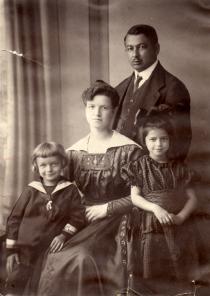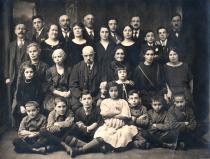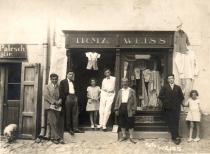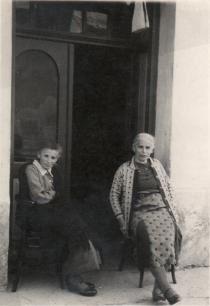PAVOL SKALICKY
Slovakia
My name is Pavol Skalicky.
I was born in 1949 in Kosice. My parents come from central Slovakia. My
father, Tibor Silberstein, was born in Kremnica in 1914. He was a
businessman. He spent World War II in the anti-fascist resistance. He died
in Kosice in 1976. My mother, Edita Weissova Silberstein, was born in
Prievidza in 1918. She died in Kosice in 1995.
Family background
My parents moved to Kosice after the war, when my father found a job in
this town. By that time, they already had my brother, Peter. He is five
years older than me. Peter lives in Kosice, married with two daughters, who
are also married and already have children.
My wife, Eva, comes from Kosice, too. In 1977, she gave birth to our
daughter, Linda, who studied medicine in Kosice.
I have more documents about my mother's family than my father's side. My
maternal grandmother, Irma Weissová, was born on March 5, 1882, in
Prievidza. She lived with our family until she died on June 11, 1969, in
Kosice. Her parents were Július Steiner, who was born in Bosáca, Slovakia;
and Júlia Lovingerová, who was born in Austria. I don't know the exact
place of her birth. From my mother I learned that she lived 103 years. My
great-grandparents had 10 children - six girls and four boys. One of the
girls was Irma Steinerová, my grandmother.
My grandmother Irma married Adolf Weiss. They had seven children - five
sons and two daughters. One of those was my mother, Edita Weissová. My
mother had a high school education and worked as a shop assistant.
Grandfather Weiss was born in 1877, but died quite young in 1920, at the
age of 43, just after the youngest girl, Josefina, was born. My mother was
only 2 when she lost her father. At the time of his death, my grandfather
was a groundskeeper of Pálfy properties in Bojnice. He was killed in a
traffic accident while driving a horse carriage. The reason why the horses
started to stampede is not known but the carriage toppled, and my
grandfather did not survive. My grandmother did not marry again and,
according to my uncle, she could hardly accept her fate, that her husband
died and that she would have to take care of seven children by herself.
However, her parents were well-situated, and helped her. They continued
helping her until her sons completed their educations, and took over the
responsibility of supporting their mother. The family not have big
financial problems.
Grandmother's oldest son, Vojtech Weiss, was born in 1908 in Prievidza. He
was a lawyer. Before the war he went with his brothers to Tanger, Morocco.
They were businessmen in some international trading zone.
The second son, Alexander, born in 1910, worked in Slovakia as a sales
representative of the Bata Company, and he spent the war years in Indochina
and Saigon, Vietnam. He died in Casablanca, Morocco, in the 1960s.
Edmund Weiss, the third brother, was born in 1912, and worked as a director
of the Bata Company for Moravia and Slovakia, but was also managing the
partnership with his brothers in Morocco, who stayed there when the war
broke out in Europe. You could say that their business saved their lives,
thanks to the fact they had started as Bata representatives before the war.
By working abroad, they avoided deportations and the Holocaust.
The fourth son was Tibor. He was born in 1914 in Prievidza. He worked as a
sales representative for a company in Slovakia. He was deported from Zilina
and died in Auschwitz.
The youngest son, Ladislav, was born in 1916. He was a lawyer. He studied
in Prague at the Charles University, and after graduating from the law
school he also went to Casablanca, Morocco, following his brothers, and was
lucky escape the atrocities of war and the Holocaust. After liberation, he
came back as an enthusiastic builder of Czechoslovakia. Nevertheless, he
was persecuted, fired from his work, and forced to find a job as an
unskilled worker. After some time, he was rehabilitated. Today he is 83,
lives in Prague and is married to a woman who is not Jewish. They don't
have children.
The youngest child in the family is my Aunt Josefína. She was born in 1920.
She survived the Holocaust and lives in Cologne, Germany, where she
emigrated in 1968 or 1969. She followed her children, who emigrated to
Germany some time earlier.
Július and Júlia Steiner (nee Lovingerová), my great-grandparents and the
parents of my grandmother Irma, had 10 children. The boys were Jozef,
Izidor, Jakub and Eugen. Jozef completed a secondary school in Prievidza
and worked as the head of the post office in Dolny Kubín. Izidor lived in
Topolcany. He had a workshop where he dealt with agricultural machines. He
was married, but didn't have children. Jakub Steiner was a skilled
mechanic, a locksmith, who immigrated very early to the USA and, after
that, no one from the family ever heard from him again.
Eugen Steiner was a veterinarian. He worked in Szolnok and Budapest, and he
owned a farm in Sáshalombata, near Budapest. After the war, he immigrated
to the USA. There he had two children. One of them, George, became a
medical doctor. He studied in Vienna and in Lausanne and, after getting a
degree, he established a clinic in New York. He died at a car accident in
the USA, leaving two children.
One of Grandmother Irma's sisters married a Mr. Dalnoki. She died
naturally. She had another sister whose name I do not know. This family has
a sad and tragic history. They had a daughter and two sons. Both of their
parents died at the same time of Spanish flu. Jakub Steiner took care of
the sons. They were all deported to a concentration camp, where they died.
My grandmother's sister Zali married Mr. Blody. The Blody family had a
clothes shop in Prievidza. They had a son, Jeno, and a daughter, Vilma.
Next sister was Katarína, who married Mr. Fromer. Fromer's family were
salesmen in Prievidza, and owned a clothes shop. They were the competitors
of the Blody family, into which one of the Steiner sisters was married.
Katarína and her husband had two sons, Adolf and Bedrich. Adolf probably
emigrated to the USA, and Bedrich was a business partner of my uncles who
lived in Morocco.
There was one more daughter, my grandmother's sister, Etel, who married Mr.
Cigler. They did not have children. The Cigler family had a factory of
dairy products in Prievidza. They died in a concentration camp.
My only living relatives are Uncle Ladislav, who lives in Prague, and
Auntie Josefina in Germany.
Neither my father's nor my mother's families were very religious. Father's
family was small, they were only two children. His sister was two years
older. They lived in Kremnica, where they owned a little textile shop. My
grandmother's family came from Kremnica, and she had many brothers and
sisters there. One of the siblings had a small watchmaker's shop and my
grandparents had a clothing shop. Back in those days, my father's family
was named Silberstein.
My parents talked about the family history, but I have to admit it was not
a very common theme. The reason could be that a part of our family survived
thanks to their jobs and duties in foreign countries. Those who stayed here
- my mother, my father and my grandmother, as well as my older brother -
survived thanks to some good people who gave them underground shelter in
Klenovské Lazy in the mountains. My father was a member of a partisan
brigade. He survived the uprising and the period of deportations to
concentration camps by hiding in the mountains. Aunt Josefina survived in
hiding somewhere in Hungary with her husband. The others were abroad and
after the war, in the 1950, when I grew up, this just wasn't a proper
conversation subject. It was after high school that I became interested in
these matters and began to learn more about my family.
Being Jewish
I remember an interesting moment when I learned I was actually Jewish. It
was an experience I remember very well. When I was 6 and at school for the
first time, a girl mocked me for being a Jew. I had no idea what it meant
and why she was making fun of me. I only understood that it was some
mockery. I reacted very simply and physically attacked her, not driven by
the meaning of an insult at all. I probably beat her and she complained at
home. When the case was examined, since her parents came to school
complaining that I had hurt their daughter, the teacher had to examine the
origin of the conflict. I told her exactly how it all had started. So, for
me I learned for the first time that there is something called Jewry and
Jew.
My parents were called in to meet with my teacher. Fortunately, we had a
very good teacher who knew the case very well and found out that the girl's
parents were talking at home about my parents and had made abusive remarks
about Jews. Their little girl did not understand the meaning of their
words, but did understand the character of the speech. The teacher
energetically asked the parents to change their attitude in front of their
child, to behave in a civilized way.
Concerning the expression of the Jewish religion in our family, to be
truthful, it was not present. I think the situation developed in such a
direction because of what my mother's siblings had gone through, so at home
we simply did not talk about it. I learned more about these things only
after I got married.
I married a Jewish girl, but not because she was Jewish. I did not even
know at first. I found out about her origin later, when we were dating.
Actually, she is Jewish because her mother is Jewish; her father was not
Jewish. As I married a Jewish woman from a family where this tradition was
much stronger, I learned much more about the Jewish religion than in my
own.



